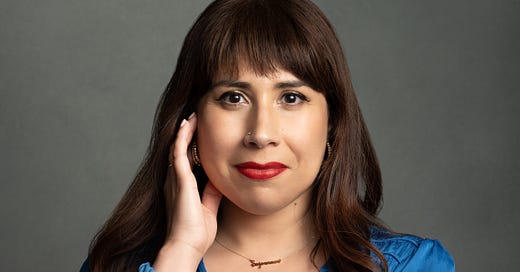“The fact that so many Brown girls across the country have connected to this book makes me believe that I've done the right thing.”
Author Erika Sánchez discusses the costs of book banning for young readers.
Erika Sánchez needs little introduction. Her novel, I am Not Your Perfect Mexican Daughter, is a modern classic, beloved by readers globally and currently being adapted into a film by America Ferrera. Her recent memoir, Crying in the Bathroom, only adds to the reasons why Erika’s voice is so important right now.
Describing La Cuenta’s focus on the voices of individuals labeled as undocumented over Zoom, Erika connected with our work, offering a tiny glimpse into her current writing:
“I'm interviewing women for my next novel, and most of them are undocumented. And just learning about what they go through has been really overwhelming. It's something that I'm constantly thinking about, especially now, here in Chicago, with immigrants being sent here against their will essentially. It's a humanitarian disaster, what's happening right now.”
Alongside its popularity, I Am Not Your Perfect Mexican Daughter is often a part of an ongoing conservative fight to censor and ban books in schools right now. Knowing that her books continue to make tremendous impact on young readers, contributors to La Cuenta, and to our broader community, we asked Erika about her experiences as an author of a frequently challenged novel.

ALIX DICK: We are so grateful for your time. We wanted to first understand your own experiences of your book being challenged or banned.
ERIKA SÁNCHEZ: I’ve lost track of how many places have banned my book. I used to be able to generally say, "Oh, Missouri and Texas …" whatever. But now it's spread quite widely. I'm really disturbed by it all because it sends a message that they don't really want us to exist at all. I think the title itself and the cover with the brown girl: that doesn't sit well for a lot of conservative people. We're seen as these invaders in this country. I think a lot of the times, people who complain about it haven’t even read it, and that's really upsetting.
I talk about this a lot on my podcast, this post-truth world where reality doesn't matter. Anyone can say anything. And that's really disturbing to me. People can say things about my book without having read it.
People have tried banning the book because they had a problem with the sex. Other people have had problems with [the protagonist, Julia’s] language, the fact that she curses so much. I guess they've never met a teenager. There's also this element that she's questioning the church. She's a girl who's not submissive. She's very alive.
Really what they are uncomfortable with is that she takes up a lot of space, and she defies these notions that are very, very ingrained in our society, these ideologies of white supremacy and misogyny. That's not what they'll cite necessarily, but that's it. I think that's the reason that it gets banned.
Really what they are uncomfortable with is that she takes up a lot of space, and she defies these notions that are very, very ingrained in our society, these ideologies of white supremacy and misogyny. That's not what they'll cite necessarily, but that's it. I think that's the reason that it gets banned.
ANTERO GARCIA: The conservative movement is threatened by outspoken brown women.
ES: [Julia] doesn't mince her words about white people and whiteness. That takes people aback at times. I think that's the truth. The fact that so many Brown girls across the country have connected to this book makes me believe that I've done the right thing, that I've created this piece of art that speaks to young, disenfranchised people. I write for them. I write for my community. I don't write for Karens.
Here's a little story about an actual Karen who emailed me: she wrote and said, "I read your book. I just want to know, what are you trying to say to a person like me?" I didn't reply because I have nothing to say. It's not about you. For once, think about other people and how this is relevant to others that are unlike you. The censoring of non-whiteness is a scourge upon our country, and any defiance or questioning of that is going to create some backlash.
AD: Has this been a challenging period for you?
ES: It's been quite a ride. I went to the state capital in Utah last year to protest their book banning bill, and there were protesters there. We were protesting, and then they protested our protest. It was so bizarre.
AD: That sounds awful.
ES: It was terrible. They had these poorly made signs and they're just trying to cause a disturbance while we were speaking about why books matter and why kids need to have access to books. But the book thrives despite all that. Some people say it continues to thrive because of these things. I don't see it that way. It's mostly really upsetting to me. It's not a badge of honor. It's a sign of some really scary times.
AD: Why do you think this happens to you in comparison to other writers?
ES: Perhaps the book has just done so well that it can't be ignored, and it's going to be a movie. You can't pretend it's not there. I've been very lucky in that way, and also, I've always been very vocal about these issues. I don't mince my words. I say what I mean. I have a podcast in which me and my other hosts, we talk about the heaviness of white supremacy, but we also laugh about it.
AD: I love your podcast; I think you all are hilarious.
ES: It's always a good time. That's why we do it because it's cathartic for us personally and then to share these conversations with the public, “with the children,” we always say. It's really great. I've gotten some really nice responses from people feeling comforted by the podcast because we do talk about these issues in such a frank way. Then we laugh about it and because what else do we do? I think Mexicans are built that way. That's just how we survive.
AG: Connecting to the idea behind La Cuenta, I’m curious how you see the toll of people not being able to access a book like yours. What are the costs of book banning broadly, as well as for the Brown girls that are seeing themselves in I am Not Your Perfect Mexican Daughter?
ES: There are so many costs. A lot of Brown girls in these predominantly white areas, I assume, will not have exposure to this book, and this is something that could really change the way they feel about themselves and the world.
I've been told many, many times that the book has really illuminated a lot for readers. It makes me sad that there are going to be swaths of young people that are not given that option to read the book because it's not taught, or because it's in the library, but the circulation is monitored. I find that so disturbing. I feel terrible for librarians who have to endure these kinds of things because they know that it's wrong, but what can they do?
I worry about them. I also worry about just other people who can empathize with our experiences because fiction, for me, it was a way into issues of slavery, and racism, and sexism, things like that.
Having your mind awakened, becoming woke. People talk about woke like it's this terrible thing. It's like, well, what's the opposite of woke? Is that really what you want? You want to be asleep? It's unbelievable the way that the discourse behind this is so fascist. It scares me.
It makes me sad that there are going to be swaths of young people that are not given that option to read the book because it's not taught, or because it's in the library, but the circulation is monitored.
AG: One cost of the book being banned is this possibility of connection and understanding?
ES: Yeah, empathy is so important. To sit with a character for a whole book and feel what they feel, that's so powerful. It's changed my life, obviously, and I know it's changed millions of other lives. So just the idea that people aren't given access to a story about a person who's not like them—a person who is overlooked typically in society—and they're trying to perpetuate that.
They're trying to marginalize us further and so it's satisfying that, despite everything, the book has done extremely well. But I worry about those who just won't even know about it because they're not allowed to access this book.
AG: When you talk about empathy, it feels like such a fundamental part of being human. It’s one of the heaviest costs in come ways.
ES: Exactly. That's radical. Being a person who cares about other people: that is looked down upon by certain kinds of people, conservatives mostly. What the hell are we doing with ourselves in this country? What is happening? Where are we going? I have all of these anxieties, but, still, I keep writing.
Propina
We’ll share the second half of our conversation with Erika Sanchez next week. If you haven’t read any of her books, we encourage you to give them a read (or listen). And check out Erika’s podcast, “No Chingues”:
Lastly, we were thrilled to connect with many new writers at the UndocuProfessionals conference last week. If you are interested in contributing to La Cuenta, please take a look at our guidelines and get in touch!
We’ll see you next week.






